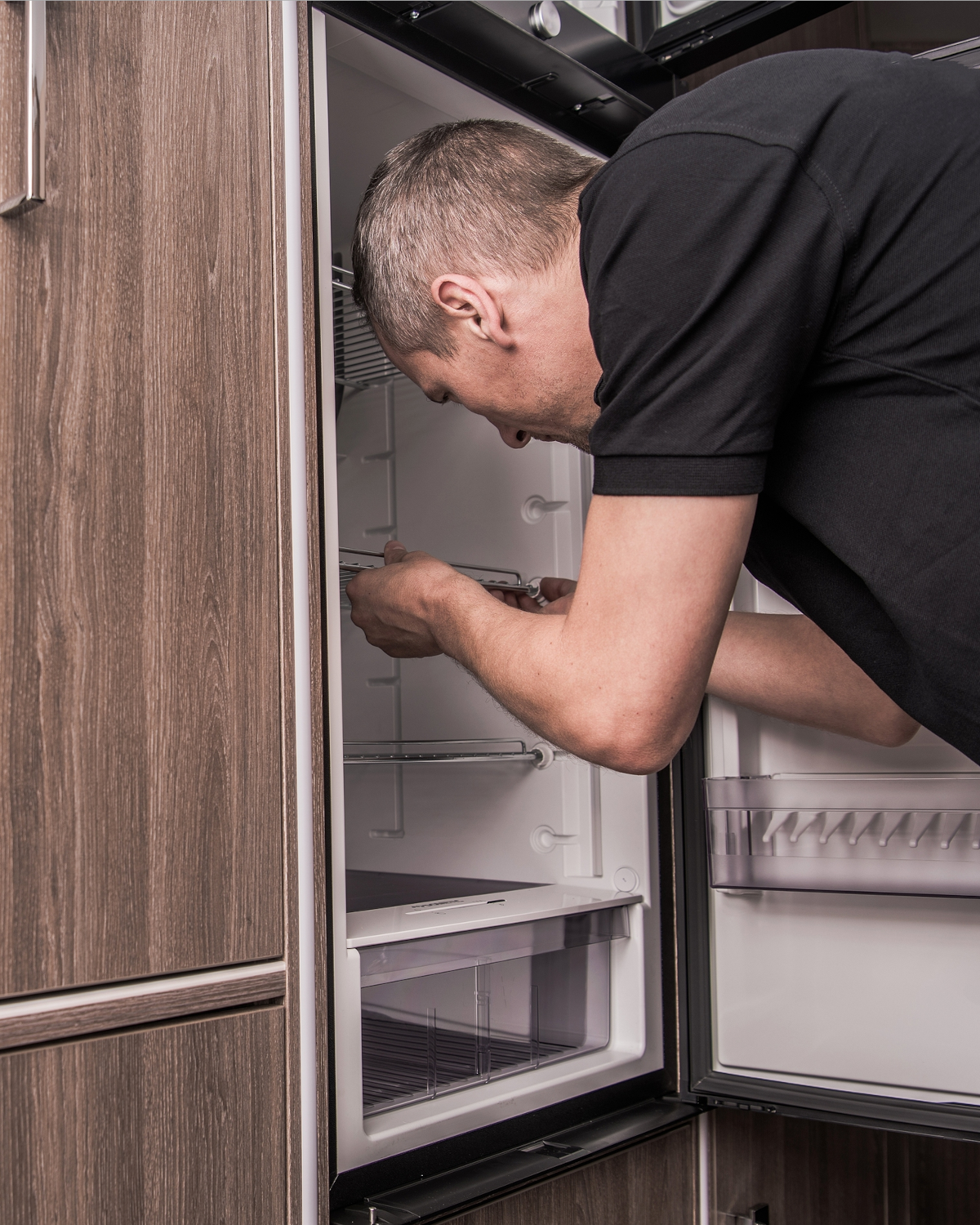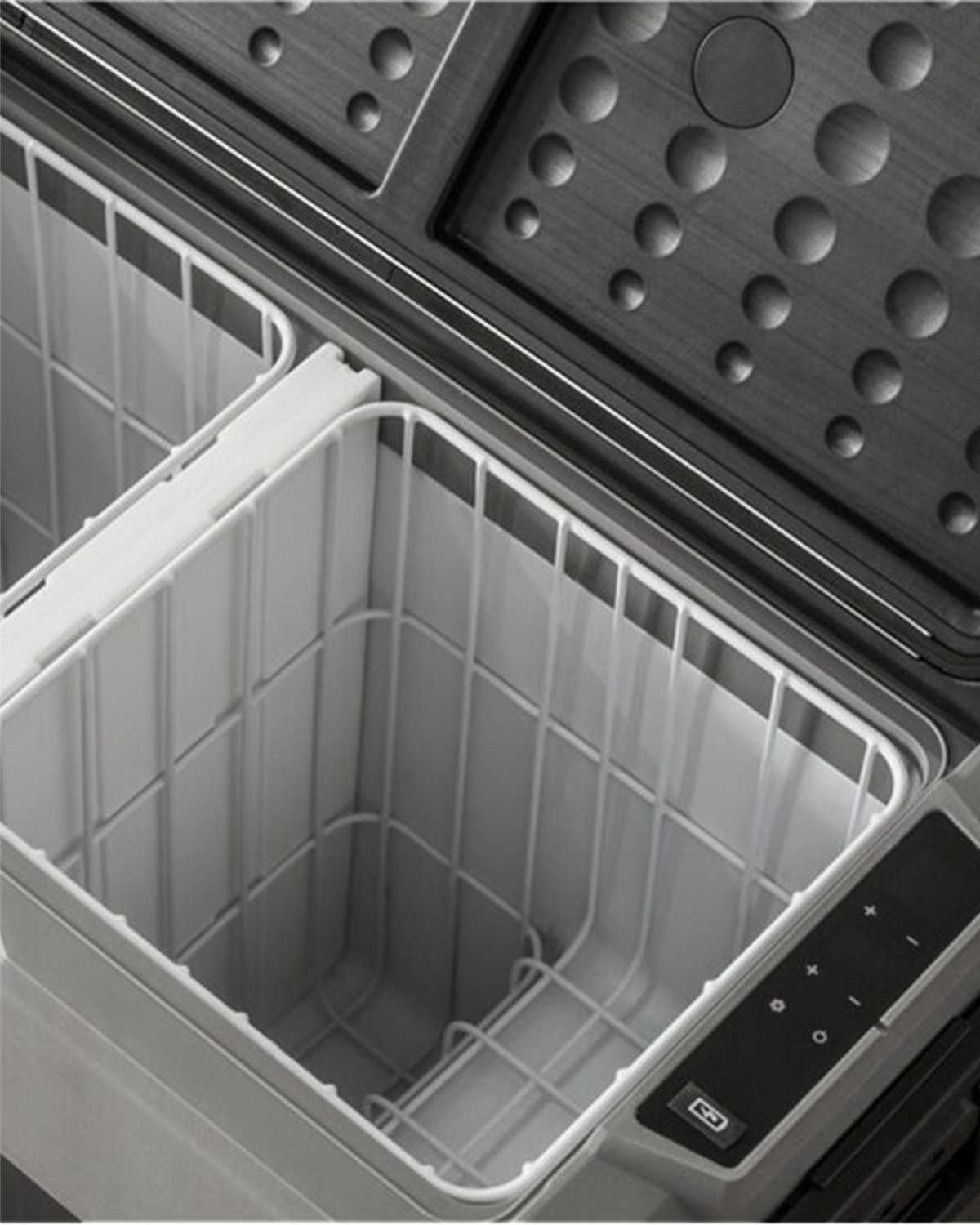We’ve got detailed reviews and comparisons of 5 of the best RV refrigerator models. Plus, we’ll help you figure out what type of RV fridge is best for you. We’ve even included a comprehensive buyer’s guide. So if you’re looking for a new refrigerator for your RV, you’re in the right place!
RV refrigerators are necessary for serious road trippers, RVers, and campers. They keep food fresh, drinks cold, and make life on the road a whole lot more pleasant.
But with so many different types and models on the market, it can be hard to know which one is right for you.
This guide covers everything you need to know about RV fridges. It includes:
- detailed reviews of the 5 best RV refrigerators,
- a complete explanation of the different types of RV fridges,
- A detailed buyer’s guide, so you know what to look for when shopping,
- loads of helpful tips on how to use a fridge in an RV and keep it in good working condition,
- and more.
So whether you’re a first-time RV owner or a seasoned pro, this guide will give you all the information you need to get the best RV refrigerator for your next road trip.
When you click on links to various merchants on this site and make a purchase, this can result in this site earning a commission. As Amazon Associates, we earn from qualifying purchases. For more info, please check our disclosure page.
At A Glance | The Best RV Refrigerator Options This Year
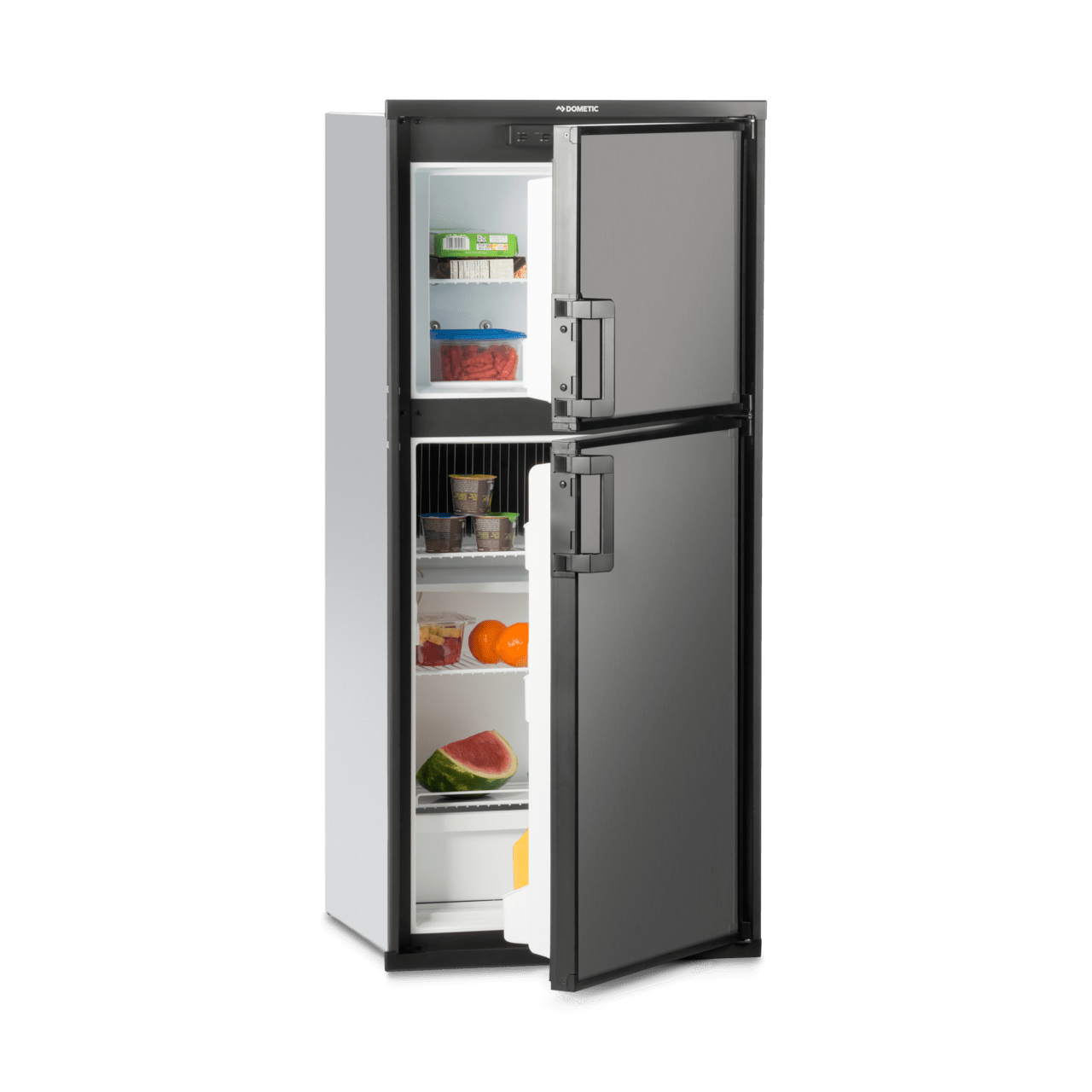 |
1. Best 2-Way Fridge – Dometic Americana II
|
CHECK PRICE ► |
 |
2. Best 3-Way Fridge – Norcold Polar 3-Way Refrigerator
|
CHECK PRICE ► |
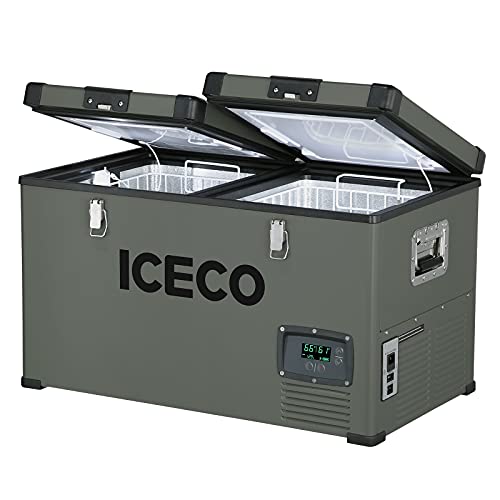 |
3. Best 12V Refrigerator – ICECO VL60 Dual Zone Portable Refrigerator
|
CHECK PRICE ► |
 |
4. Largest Storage Capacity – Dometic Elite 2+2 Refrigerator
|
CHECK PRICE ► |
 |
5. Most Portable Fridge- Norcold NRF 30 Series Fridge Freezer
|
CHECK PRICE ► |
Best RV Refrigerator In 2023 (Reviews and Comparison)
RV fridges are evolving each year. Manufacturers are coming out with 2-way and 3-way fridges that have more space than before. In addition, they’re equipping them with RV-friendly features such as:
- rugged frames,
- adjustable shelves,
- eco-friendly lighting,
- and lower power draw.
So what’s the best in the market right now? We’ve reviewed the best RV refrigerators with a summary of their features, why we chose them, and their pros and cons.
We’ve covered refrigerator options suitable for a whole range of RVers, including:
- large & small RVs
- powered by various files – propane gas, mains electric, battery power, and a combination of all three,
- and features useful for different types of trips.
1. Best 2-Way Fridge – Dometic Americana II
Specification
- Storage Capacity: 6 cu. ft.
- Weight: 115 lbs
- Size: 26″ x 54-21/32″ x 24-7/8″ (D x H x W)
- Power Source: 2-way, AC and LP
- Freezer compartment?: Yes.
- Power Consumption: 440W
- Left/Right Hinge?: Reversible
The Dometic Americana II is the perfect compromise between 2-way and residential refrigerators. It works on electric and LPG, but it also has 6 cu. ft. of space to hold all your food and drinks.
But that’s not all this fridge has to offer. Its solid steel frame is made for travel on the road.
Dometic has thoughtfully put in reversible hinges. That means you can buy this refrigerator with both a left-open or a right-open configuration, depending on how you need it in your RV.
It also has hinge locks to keep the doors shut during travel.
The Americana II saves your energy when you are out camping.
Despite its size, the fridge has features like a low-power LED bulb to save you precious watts when using a solar battery or a generator.
It also switches to LPG automatically for the best cooling.
What We Liked
It’s designed and built for the road, with valued features for ardent RVers:
- 2-way power for when you are off-grid,
- the solid steel frame makes it robust enough to handle the bumps on the road,
- reversible hinges make it suitable for every kitchen orientation, and
- door locks prevent the contents from spilling out while you’re in transit.
This RV fridge freezer does a bang-up job at cooling. The freezer can go down to -20F, and the fridge compartments go to a comfortable 34F, so your produce is always safe.
Moreover, apart from the 6 cu. ft. of space, there’s a lot of customization you can do to pack in more stuff:
- There are two crisper drawers for your veggies and produce,
- Two adjustable glass shelves to accommodate bigger and smaller grocery items,
- Three-door bins that are again height-adjustable.
We also love the detail that makes using this fridge easy. Simple things such as:
- putting the controls at a comfortable eye level, and
- better quality seals,
are other features that make this product one of the best overall fridges for RVers.
What We Didn’t Like
Its steel frame makes it sturdy but also makes it heavy. Make sure your RV floor can handle the 115-pound weight before putting this guy in.
It’s big, and we don’t mean the weight now. Look at the dimensions: 26″ x 54-21/32″ x 24-7/8″ (D x H x W). That’s quite deep and wide so take care to measure up before you buy.
Some buyers have a grouse with this product: Dometic does not sell the front door panels as part of the fridge.
But that’s so you can completely customize it to suit your RV interior. You can buy the door panels separately, though it works just as well without them.
Pros
- Sturdy
- Adjustable glass shelves and door bins
- Big on space
- Switches automatically between LP and AC
- Lots of RV-friendly features.
Cons
- Big and heavy
- Need to buy door panels separately.
2. Best 3-Way Fridge – Norcold Polar 3-Way Refrigerator
Specification
- Storage Capacity: 7 cu.ft.
- Weight: 132 lb
- Size: 24″ x 52-7/8″ x 23-1/2″ (D x H x W)
- Power Source: 3-way AC/LP/DC
- Freezer compartment?: Yes
- Power Consumption: 300W
- Left/Right Hinge?: Select when buying
If you need a large refrigerator to work on any power source, including the RV house batteries, the Norcold Polar 3-way is an excellent choice.
With 7 cu. ft. of space and 3-way input power, the Norcold is perfect if you live or travel in your RV year round.
One of the first things that will strike you with this fridge is its sleek look. There are no visible hinges and no protruding handles. The control panel between the refrigerator and the freezer compartment looks ultra-modern.
But you are bound to be even happier when you open the door. There are four height-adjustable shelf trays (with the bottom one being width adjustable as well), two crisper trays, and four door bins.
The folks at Norcold know they are giving you a lot of space and have put glass shelves to best use it.
It also has nice features like a thermostat control option, and the refrigerator can operate even at 0°F ambient temperature.
What We Liked
We love how sleek it looks. Despite the 7 cu. ft. of space inside, the cutout dimensions are actually smaller than those of the Dometic Americana II.
That means it won’t stick out into your RV kitchen but will remain flush with your cabinets.
We also think that the 3-way option is perfect for when you want to keep the fridge running while driving.
Absorption fridges don’t work well when the ambient temperature is below 5F. However, the cold weather mode is a good feature for those who live out of their RV, even in winter.
Another handy feature is that you can set the internal temps in the fridge using the thermostat controls.
You don’t have to track the internal temperature with a remote thermometer to ensure your food is safe.
What We Didn’t Like
Norcold doesn’t include the door panels in the price, which is a bummer. It’s a common feature of RV refrigerators but spending more on an already hefty price tag really niggles.
The fridge doesn’t have reversible hinge doors. That said, models are available with a right or left swing. Be sure you select the right model for your kitchen.
The freezer compartment is relatively large. It could have been smaller, which would have given more space to the fridge area.
But that’s just a personal thing. If you’re looking for a big freezer, this Norcold model is ideal.
Pros
- Super-sleek
- 3-way powered
- Lots of space
- Adjustable temps
- Cold weather mode up to 0°F
- Comparatively inexpensive.
Cons
- Door panels are not included.
3. Best 12V Refrigerator – ICECO VL60 Dual Zone Portable Refrigerator

Specification
- Storage Capacity: 2.1 cu. ft. (63.4 quarts)
- Weight: 65.7 lbs.
- Size: 19.4″ x 18.8″ x 31.2″ (D x H x W)
- Power Source: DC and AC
- Freezer compartment?: Yes
- Power Consumption: 85W
- Left/Right Hinge?: Chest style, top loader
The ICECO VL60 is one super durable 12V fridge for those who don’t need a big space for food and drinks.
It has two compartments, each of which can work as a fridge and a freezer. So that gives you a lot of flexibility in the 63 quarts of space you get.
This fridge is built for those who love to boondock in rugged terrain. It has a 0-50°F temperature range and can cool despite parking at a tilt of up to 40 degrees.
It works on both DC and AC power and uses up merely 85W even in its Max cool mode. In addition, it has max and eco modes for optimum cooling.
What We Liked
Its rugged build is a feature that makes it stand out. The exterior metal casing, with 60mm thickened walls, and a protective cover, keeps it ready for use in any weather conditions.
It’s also got locking hinges and a top lid design to keep the contents safe even on bumpy rides.
And top loaders are far more efficient at keeping food cool when you open the door than front loaders.
Its dimensions are perfect for fitting into the tonneau cover of a pickup, and you don’t need a huge space to put it in.
Despite its small size, it can hold nearly 90 cans of soda or 50 water bottles, so the space available is impressive.
Moreover, you can maximize space by configuring each compartment to work separately as a fridge or freezer.
What We Didn’t Like
All that protective metal casing has a downside – it weighs around 66 pounds, despite its small size.
While it draws only 85W in the max mode, the unit often runs its compressor. Unfortunately, that can be a significant drain on your batteries if you are not careful.
It does take time to cool. In Eco mode, it will take up to 8-9 hours to reach ~40F.
Pros
- Sleek and small
- Lots of flexibility in space
- Rugged design
- Works on a 12V battery at just 85W – perfect for dry camping.
Cons
- Limited space
- Takes time to cool, and the compressor often kicks in
- A bit noisy
- Expensive.
4. Largest Storage Capacity – Dometic Elite 2+2 Refrigerator
Specification
- Storage Capacity: 12.5 cu. ft.
- Weight: 242 lb
- Size: 28-1/16″ x 33-11/16″ x 64-17/64″ (D x H x W)
- Power Source: 2-way AC and LP
- Freezer compartment?: Yes
- Power Consumption: 420W
- Left/Right Hinge?: Both
When camping with the family or living in your RV, you probably need the same kind of space in your fridge at home.
The Dometic Elite offers a whopping 12 cu. ft. of space, making it the largest and best RV fridge on our list.
The double door refrigerator has space in abundance. But, it’s not just the space but the number of shelves and trays that let you use that space effectively.
It includes:
- three crisper trays,
- four door shelves on each door
- four large trays in the main fridge, and
- a separate ice maker in the freezer,
There are a lot of places to put all your fresh food, drinks, leftovers, frozen foods, and more.
The Dometic Elite is a 2-way fridge that works on both LP and AC, so it’s a good option for year-round RVers.
What We Liked
Obviously, the space it provides on a 2-way power option is impressive.
It’s got a lot of features perfect for living in a van:
- Door locks (manual),
- Shelf guards to hold food securely,
- Adjustable racks,
- A rugged steel frame.
The racking system offers many options, so when you use it wisely, you can pack a lot of food.
What We Didn’t Like
It is super heavy and takes a lot of space, so ensure you know what you are getting into before buying.
Measure everything, and you may need to consider reinforcing the flooring on your RV.
Pros
- Lots of space
- Convenient rack system
- Eco-friendly lighting and refrigerants.
Cons
- Expensive
- Heavy and large in size
- No door panels included.
5. Most Portable Fridge – Norcold NRF 30 Series Fidge Freezer

Specification
- Storage Capacity: 1.1 cu. ft.
- Weight: 39.6 lbs
- Size: 22″ x 15.6″ x 15.7″ (D x H x W)
- Power Source: DC power supply (also comes with an AC adaptor)
- Freezer compartment?: Yes
- Power Consumption: 63W
- Left/Right Hinge?: Easily reversible and removable hinged lid
If you only need a small space to pack enough food for a few days of camping, the Norcold NRF30 is small, sleek, and rugged enough to do the job.
It works on a 12/24V DC power supply and is explicitly designed to reduce battery drain.
You can set three power draw levels to optimize how much power it draws. It draws a max of 63W.
It’s lightweight, compact, and even has a convenient handle to carry it around. That makes it a perfect multi-purpose fridge. Take it in your RV or car, or use it in your garden.
Despite its size, it has rugged steel interiors and a small freezer compartment for frozen foods.
What We Liked
It is compact and lightweight (weighing about 40 pounds) and has a handle to carry and pull it around.
Despite its small size, it has a separate freezer section for your meats and frozen foods.
It has temperature controls and low voltage protection.
What We Didn’t Like
What makes this one of the best RV refrigerator models is also its only downside: it’s small. So if you’re buying it for its portability, just remember it’s not versatile enough for longer trips that may demand more fridge space.
Honestly, though, that’s probably splitting hairs.
Pros
- Small and light
- Inexpensive
- A good option for solo trips and short trips
Cons
- Space is low
- The plastic exterior can warp if exposed to high temperatures in direct sunlight. That’s the nature of plastic, though.
Types of RV Refrigerators
Traditional RV refrigerators were absorption fridges and worked on propane or shore power. But, RV refrigerator technology has evolved. So now we have different types, each with its own pros and cons.
Today, there are three main types of RV refrigerators:
- Absorption refrigerators
- Compressor refrigerators
- Residential refrigerators
Another way to classify RV refrigerators is by their power source.
There are three types of power sources for fridges:
- LPG/propane gas,
- 12/24V DC, and
- 110/240V AC current.
Most RV refrigerators are either:
- 120V AC (or 240V)
- 12v DC
- 2-way refrigerators (propane/LPG and 120V AC)
- 3-way refrigerators (propane/LPG, 12/24V DC, and 120V AC)
The following sections explain how each type of RV refrigerator works. It covers their advantages and disadvantages to help you figure out which type is best for you.
How Does An Absorption Refrigerator Work?
You might be surprised that an absorption refrigerator cools things by burning fuel!
So if you’re wondering how burning something can help drop temperatures, here’s how that magic happens.
- Step 1: Liquid ammonia is heated by either propane, solar cells, a generator, or an AC input. Ammonia has a low boiling point, making it evaporate quickly, turning into gas. It also absorbs heat from inside the fridge as it evaporates, cooling it down.
- Step 2: The refrigerant gas is absorbed by a salt solution which is then heated to cause the ammonia gas to separate again.
- Step 3: The hot ammonia vapor is passed through a heat exchanger. It releases heat to the external environment, cooling down and returning to a liquid form.
Since the process doesn’t need a motor, there are no moving parts inside an absorption fridge.
The cooling process takes time (because you need several cycles to cool the fridge), so you should ideally precool it before heading out for a trip.
How cool the refrigerator gets depends greatly on the ambient temperature.
The science of gasses changing state is at play, so the temperature of an absorption fridge is directly related to the ambient temperature.
So to be blunt, it won’t get as cold when the weather is scorching.
You know? Just at that moment, you’d love a cold beer, complete with condensation running down the side of the bottle.
Finally, an absorption refrigerator must be level for the most efficient cooling.
If the refrigerator is tilted even a little bit, the cooling process will not work as smoothly. It may even be damaging over a prolonged period.
Moreover, absorption refrigerators can suffer ammonia leakages. You’ll need to fix that problem with a replacement part.
You can buy a good absorption refrigerator for between $200 to $3500, depending on the brand, size, and model you need.
Pros
- Many older RVs have built-in absorption refrigerators. They have features suited for running a refrigerator in an RV, such as a door lock for when you are on the road.
- Absorption refrigerators can work on propane gas, 12V DC, and shore power. That makes them perfect for boondocking.
Cons
- Since their cooling process is rather primitive, the ability to cool is not as great as a compressor refrigerator. So if you are going on a trip where it’s going to be hot and sunny, your absorption refrigerator may not be the best option.
- You can try some tricks to cool them down (parking in the shade, using air circulation fans, etc.), but it still won’t make up for the difference in cooling power.
- You need to park level. Otherwise, your refrigerator coolant may leak or may not cool properly.
Absorption refrigerators used to be the most common type of RV fridges. This is because they were cheaper on both the pocket and the energy consumption. Both of these points remain true.
However, the latter isn’t as relevant because battery technology has advanced.
Plus, compressor refrigerators have more significant benefits than absorption fridges. That makes the compressor fridges a better value modern option for many.
How Does A Compressor Refrigerator Work?
A compressor refrigerator uses a chemical known as a refrigerant – either HFC or HCFC. Refrigerants have a particular property – they become liquid when cooled down.
The cold refrigerant liquid is made to pass through coils in the refrigerator. But, first, it’s forced through a tiny hole – a thermal expansion valve – that converts it into a mist.
This mist absorbs heat from the fridge, cooling everything down in turn.
The cold mist then travels to the compressor, which pressurizes and heats it up, causing it to liquify.
The liquid is then passed through external coils, dissipates heat, and cools again.
This cooling and heating process continues until the inside of the fridge reaches the desired temperature. At this point, the compressor stops pumping the refrigerant.
Most compressor fridges for RVs fall between the $500 to $2000 price range.
Pros
- Compressor refrigerators aren’t as affected by ambient temperature as an absorption fridge. The compressor will continue to run until it reaches the set temperature.
- You can regulate a compressor fridge’s temperature to use it as a fridge, freezer, or both.
- They have more internal space than an absorption refrigerator for the space they use.
- Compressor fridges don’t present an inherent fire hazard because they don’t run on propane,
- They can work well on AC or even 12V DC power and don’t need propane or LPG. They don’t need an exhaust either.
Cons
- Compressor fridges are more expensive than absorption fridges.
- They need electricity to run and cannot run on propane.
Compressor fridges are the modern-day option for RVs. Advances in battery technology mean that running on even when boondocking is achievable.
How Does A Residential Refrigerator Work In An RV
Residential refrigerators are compressor fridges designed for the home. They need a constant 110V or 240V electrical supply. They are literally the exact same fridges you would consider for your home.
They tend to be much larger than absorption and 12V compressor fridges designed for RVs.
Historically, residential fridges were used in RVs and campers by those who typically use their RVs only when hooked up to shore power.
Campground pedestals offer a (usually) uninterrupted power supply. So, there was little worry about spoiling a fridge full of fresh produce.
Inverters convert the battery’s DC power to AC, but it’s a less than efficient conversion.
Again, battery technology has changed the playing field.
While there is some energy loss in using an inverter, residential fridges are much cheaper than 12v fridges.
Moreover, because we can carry significantly more battery bank capacity, they are now genuine contenders, even for boondocking.
Some residential fridges are so much more efficient than the RV models that they can be energy-saving. Especially when coupled with a smaller, dedicated inverter.
If you want to use a residential fridge while boondocking, aim for a low-powered, highly efficient model as they’ll use less energy.
Even modern large models, like those you may typically see in a home, could run off a battery bank or generator.
However, if you enjoy boondocking, you probably already have your solar power system set up, so you may not need to invest further.
Depending on size and brand, a typical residential refrigerator might cost anywhere from $120 to $2500.
Pros
- Residential refrigerators usually have much more space.
- They are typically cheaper than the ones designed for RVs.
- They are often more energy-efficient than RV models.
- Small, efficient models can run on an RV battery bank.
Cons
- Large residential fridges most likely need shore power for continued use.
- Since they are not explicitly designed for RVs, they don’t stand up so well to life on the road. Often they have glass shelves, and you need a creative way to lock the door while traveling.
RV Refrigerators Have Multiple Power Options
If residential refrigerators are cheaper, better at cooling, and more spacious than absorption refrigerators, why doesn’t everyone use them in RVs?
The answer lies in the flexibility of power options.
RV refrigerators are designed to run on multiple power sources. In contrast, residential refrigerators need either shore power or a battery bank with an inverter.
Here are the different types of refrigerators, as defined by the power options.
Propane Refrigerators
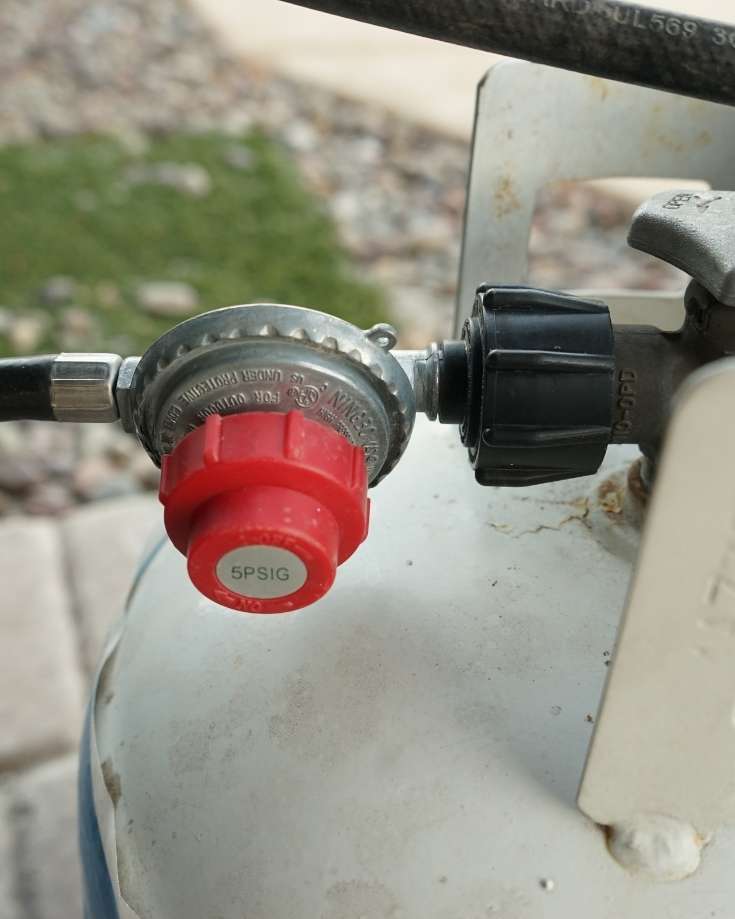
Traditional RV absorption refrigerators are designed to run on propane or LPG.
Therefore, these refrigerators could work anywhere on your propane cylinders. Still, their master circuitry requires a constant 12V DC power option, which you can supply through your RV battery.
All propane fridges are compressor-type fridges. Burning propane generates fumes and possibly carbon monoxide, so excellent ventilation is essential. Ensure your propane fridge has an exhaust directing the fumes outside of the RV for safe use.
The use of propane for heating the fridge is always fraught with risk.
Although they’re proven to be safe, we can’t help but feel anxious at the thought of a lighted flame in our camper.
Plus, you should never run a propane refrigerator while driving. Instead, you should disconnect the propane and switch to the electric mode.
12V RV Refrigerators
12V fridges are mostly compressor refrigerators that can use the 12V DC power from the RV itself. They also do not need 120V AC power to run, so they are great for boondocking.
These refrigerators have several advantages for RVs and campers:
- They are very compact and lightweight
- They are not propane-based, so they don’t have a lighted flame
- They can work well even if the RV is not perfectly leveled
- They are better at cooling than propane refrigerators.
110V RV Refrigerators
110V refrigerators are residential refrigerators that need AC power to run. That’s provided by either a power pedestal or a battery bank and inverter.
Two-Way RV Refrigerators
Two-way refrigerators are a hybrid option that can run on either:
- both 110V AC supply and propane gas tanks, or
- both 110V AC supply and 12v DC supply.
The all-electric version (AC & DC) tends to be compressor fridges, while those that use propane are absorption fridges.
Three-Way RV Refrigerators
Three-way RV refrigerators are hybrid fridges that run on propane, 110V AC and 12v DC. That makes a 3-way fridge ultra-versatile, although they’re all absorption fridges because they run on propane.
What To Look For When Buying An RV Refrigerator
If you’re in the market for a new RV refrigerator, there are a few things to consider when purchasing. But, of course, it’s not the same as buying a fridge for your home. This section will look at each factor when choosing the best model for your RV.
Reliable Brand
Choosing a reliable brand is an important factor when buying an RV refrigerator.
Some RVers use their fridge while boondocking and need it to be able to run without hookups for extended periods. Others use their RV fridge when hooked up to shore power on a campground and need it to keep food cold in hot weather.
Many RVers sit in both camps (excuse the lame pun) and use their RV fridge in both scenarios. Therefore, they need their fridge to be versatile and dependable.
Many RV refrigerator brands are on the market, but not all are created equal. Some brands are more reliable than others and have a proven track record of standing up to the rigors of RV life.
Some of the best-known RV refrigerator brands include:
Dometic
A renowned brand among RV owners for their reliable and durable Dometic appliances. Dometic offers up to a 3-year warranty on selected refrigerators, making them a go-to option for adventurers worldwide.
Dometic builds refrigerators with high-quality materials and advanced technology, making them a solid brand.
Norcold
A trusted name in RV refrigerators for years. Norcold refrigerators use a compressor and evaporator to keep items cool or frozen, even in hot or cold weather.
Most Norcold fridges have a hermetically sealed compressor with built-in low voltage protection. This means you can prevent your fridge from draining your battery bank – essential when boondocking.
Norcold refrigerators are also known for their quiet operation. So you won’t have to worry about the noise disrupting your campsite experience.
With ample space and reliable cooling power, Norcold fridges are an excellent choice for any RV owner.
ARB
ARB is an Australian company that produces a range of rugged accessories, including a line of portable refrigerators.
All ARB products are designed to stand up to off-road tracks and trails, making them ideal for those who like to explore beyond the beaten path.
ARB’s RV fridges are available in various sizes and configurations, so you can find the perfect model for your needs. Plus, their standard 3-year warranty provides a certain peace of mind.
ICECO
ICECO is a Chinese manufacturer of portable fridge models for vehicles. They have a robust and sustainable research and development program.
They have 5 warehouses across the US, so you can usually find the model you’re looking for available.
ICECO has been manufacturing high-quality vehicle refrigerators since 2005, with a good track record. Their price point isn’t super high but reassuring, not ultra-cheap either.
Type Of Refrigerator
When choosing a fridge for your RV, you must consider what type of fridge you want. Absorption fridges can be powered by propane or gas, ideal for boondocking when electricity is scarce.
However, they’re not as effective at cooling as compressor fridges.
You might consider a compressor fridge if you plan to use your RV in hot weather. Also, you may need to add solar panels to your setup, but they’ll keep your food cold even in the hottest weather.
Physical Dimensions
Because RVs are often much smaller than traditional homes, every square inch of space is precious.
If you’re remodeling your RV, you’ll need to take careful measurements of the space available for your fridge. Most new RVs have inbuilt fridges, but check the dimensions to ensure they will fit when replacing an existing RV fridge.
Also, consider how you will get the fridge into your RV in the first place. Some units are large and heavy, and maneuvering them into some RVs can be challenging.
Capacity & Storage Space
The fridge’s interior storage space is vital for any RVing family.
It doesn’t need to be too big if you’re traveling alone or with just one other person. Food will only keep fresh for so long, even with refrigeration, so a more significant capacity doesn’t mean you can stay off-grid for longer.
You’ll need more storage space if you travel with a large family.
Power Source
A residential refrigerator is a good option if you stay in RV parks and can rely on a dependable hookup.
But suppose you want the flexibility to dry camp or boondock regularly. In that case, you’ll need a fridge that can run on an alternative power source – or is efficient enough to run off an inverter.
12v fridges are ideal for those who often live off-grid and don’t have the space for propane tanks.
2-way or 3-way refrigerators are the way to go for the greatest flexibility.
Energy Efficiency
Choosing an energy-efficient RV refrigerator is vital, especially for boondocking. Reducing your overall energy consumption (propane or electricity) is always good.
But when you rely on your camper’s battery bank to provide all your energy needs, it’s vital.
An energy-efficient fridge can help you stay off-grid for longer without running your generator.
Features
RV refrigerators are a great way to keep your food cold while on the road. Here are some of the most common features to look for in an RV fridge:
- Ice makers: If you like ice on hand for drinks or camping, an ice maker is a must-have. Some RV fridges have built-in ice makers. However, they commonly clog, so consider a portable ice maker instead.
- Bluetooth controls: Some fridges come with Bluetooth controls, so you can adjust the temperature from your phone or tablet. This is an excellent feature if you’re always on the go and don’t want to have to stop and adjust the fridge manually.
- Freezer compartments: great for storing ice cream, frozen meals, leftovers, and other perishables. Many 12v fridges have adjustable freezer compartments, so you can quickly adapt their size.
- Storage layout: The storage layout inside an RV fridge can make a big difference in how easy it is to find what you need. Look for a fridge with shelves that are easy to reach and spacious enough to store everything you need.
Why Are RV Refrigerators So Expensive?
RV refrigerators are designed to withstand the rigors of life on the road. They’re built with robust construction to stand up to the constant movement of a moving vehicle.
They’re heavily insulated to keep cool even when running on 12v power.
They also offer multiple fuel options, so they can run on propane, 12v, or AC power.
These features add up to a higher price tag for RV refrigerators than residential models. But for many full-time RV owners, the peace of mind that comes with knowing a fridge will cope with everything that life on the road has to throw at it is worth the price.
Tips & Tricks For Using A Refrigerator In An RV

Invest in a quality refrigerator – it will save you money in the long run
A good refrigerator will keep your food cold and fresh for longer, so you won’t have to replace it often.
It’s also more energy-efficient, saving money on campground electric bills and performing better when camping off-grid.
Cool the fridge before you put your food away
Cooling an RV refrigerator can take several hours, so precooling it before storing food is best.
Precooling uses a lot of energy, so if you can run it on 110v, all the better. You can also help it with ice packs and parking the RV, so the area where the fridge is installed is in the shade.
Plan your food storage space carefully to make efficient use of fridge space
Packing a fridge is all about efficiency. You want to ensure you’re using all the available space without overcrowding.
So start by packing the larger items first, then fill in the gaps with smaller items.
Use plastic bins to organize things to easily see what’s inside. And don’t forget to leave some space for airflow.
Consider an RV refrigerator with a freezer for extra food storage options
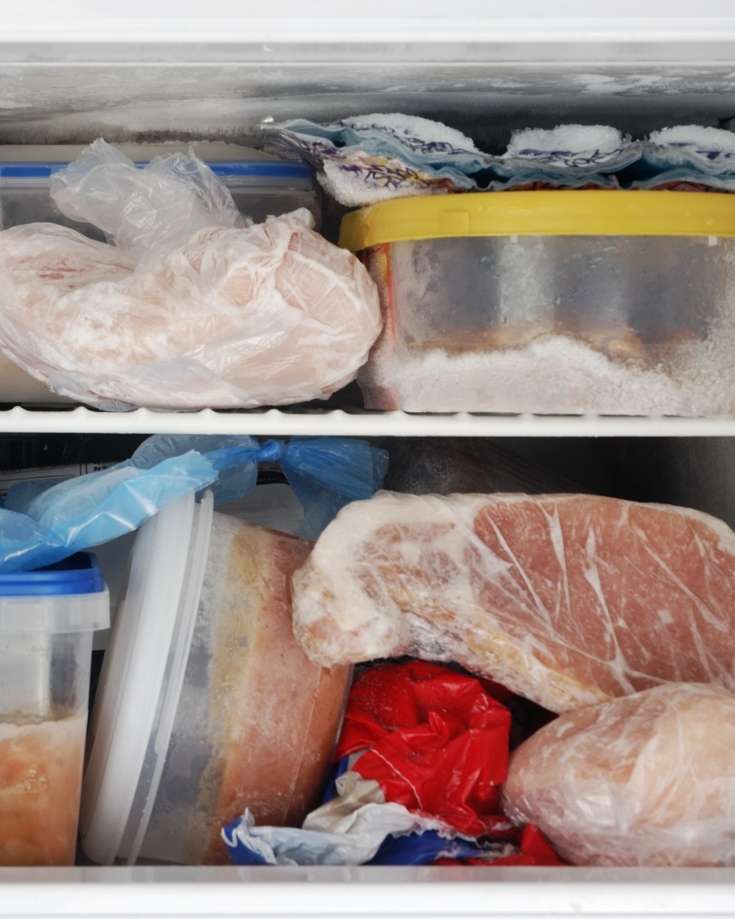
An RV refrigerator with a freezer is an excellent option if you have the space. It will give you more flexibility in what you can store, and you won’t have to worry about your food going bad quickly. Plus, it’s handy for making ice cubes if you don’t have an ice maker.
Some 12v fridges are dual-zone, so you can choose to have both sides act as a fridge, freezer, or one for maximum versatility.
Keep your RV level to help reduce propane consumption
Keeping your RV level is essential if running your refrigerator on propane. The fridge has to work harder to cool the contents when it’s not level. Then it uses more propane.
You can use leveling blocks or chocks to help keep your RV level or invest in an automatic leveling system.
Check the seals on your RV refrigerator door regularly to ensure they are airtight

One of the most important things you can do to keep your RV refrigerator running efficiently is to check the seals on the door.
Over time, the seals can become worn or damaged, letting warm air in and cold air out. This can cause your fridge to run less efficiently and use more energy.
To check the seals, close the door on a piece of paper. If you can pull the paper out easily, you should replace the seals. You can buy replacement seals at most RV parts stores.
How Many Solar Panels Do I Need To Power A Refrigerator In My RV?
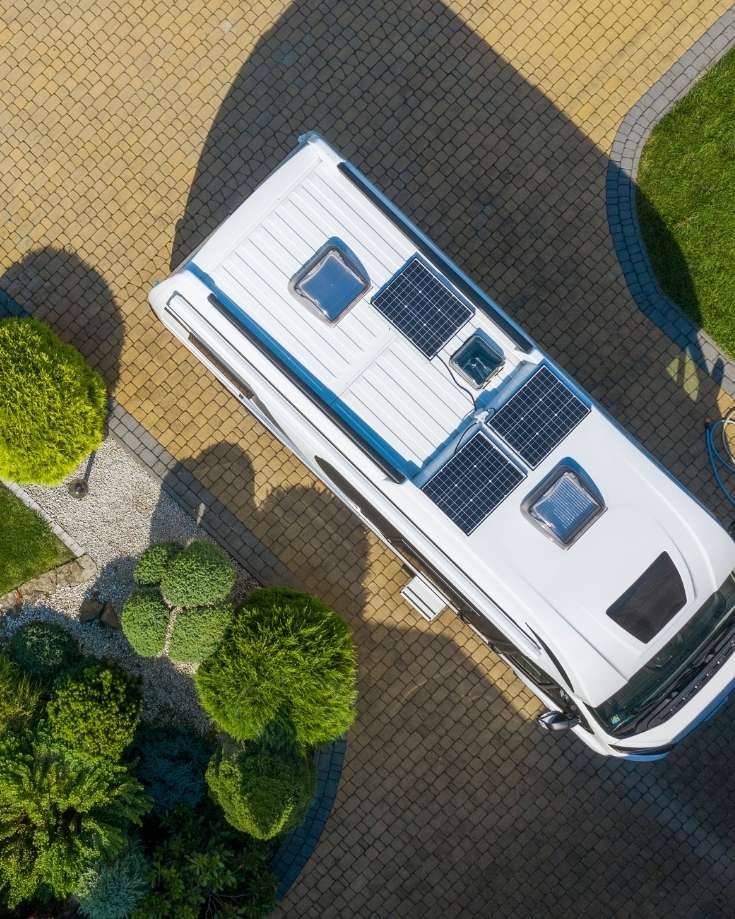
It’s a common question. But, unfortunately, many RVs don’t have robust 12v electrical systems, so it’s a vital point if you’re considering boondocking for the first time.
Without a means of storing your food and keeping it fresh, your time off-grid is likely to be cut short.
Solar panels are an excellent option for powering an RV refrigerator. They’re environmentally friendly and easy to use. But how many solar panels do you need to power a refrigerator in your RV?
The answer depends on a few factors, including the size of your refrigerator and the amount of sunlight you get.
Also, some refrigerators switch themselves on and off throughout the day to regulate their temperature. So even if it’s connected all day, it’s not necessarily drawing energy all day.
But let’s be honest, that’s not an answer to your question. In these circumstances, “it depends” just doesn’t cut it.
You need to know a few details about your situation to get a more specific answer. What is the wattage of your fridge? Is your fridge running on AC (110v) or DC (12v)?
Unless the manufacturer indicates how much power the fridge will use each day, you’ll need to assume how many hours it will run.
A good quality fridge will probably not need any more than around 18 hours each day in the height of summer. To be super safe, you could assume it will run all the time.
How much sunlight you get also affects how many solar panels you need. The answer isn’t as simple as how many hours the sun is above the horizon.
We’ve assumed you’ll get 5 hours of peak sun in this simple calculator to indicate how many panels you need to run your fridge.
So armed with your info, fill in this handy calculator.
It will tell you the minimum amount of solar panels you need to run your fridge. We’ve assumed your fridge will run for 18 hours, and you’ll get 5 hours of peak sun. For more accuracy, use our RV solar calculator.
Calculate Solar Panels Needed To Run Your RV Fridge
What Components Do You Need For An RV Solar System?
Remember, you need more than just solar panels. At a minimum, you need:
- a battery to store the energy, and
- a solar charge controller to convert the power from the panels into a form the battery can use to recharge.
Suppose you want to use the battery to run a residential refrigerator. In that case, you’ll need an inverter to convert the battery’s 12v energy to 110v. Then you need to install it.
One of the easiest ways is to buy a solar panel kit. Some even include batteries and portable solar panels. Or you can install a bespoke solar system customized to your exact needs.
You can also use alternative energy sources to power your RV fridge, such as a generator or propane. However, solar panels are typically the most efficient and cost-effective option.
So if you’re looking for how to power an RV refrigerator when off-grid, going solar is probably the way to go.
Do I Need A Refrigerator In My RV?
Do you really need a refrigerator in your RV? Unfortunately, that’s a question that doesn’t have a straightforward answer.
On the one hand, refrigerators are incredibly convenient for keeping food fresh and for extended periods. This is especially helpful when living off-grid or boondocking. It can be challenging to keep food from spoiling without a fridge.
On the other hand, refrigerators need a lot of power to run.
Therefore, they can significantly drain your battery if you’re not hooked up to an electrical source.
Many think a fridge is essential for living or traveling in an RV. Still, the truth is that many foods don’t need to be refrigerated.
For example, most fruits and vegetables can be stored at room temperature.
And if you buy food that needs to be stored cold on the day you want to consume it, that can work just as well.
So, what’s the verdict?
Ultimately, it depends on your individual needs and preferences. A fridge is probably a good investment if you enjoy having fresh food.
However, suppose you’re looking to save power or reduce weight. In that case, you may want to forego the fridge and stick to less perishable food items.
If you’re thinking about living or traveling in an RV, don’t let the lack of a fridge stop you. There are plenty of other ways to keep your food fresh.
Alternatives To Using An RV Refrigerator
Even if you decide you need a way to keep your food chilled, that still doesn’t mean you need an expensive RV refrigerator.
There are alternative accessories to help keep your food chilled, including:
- Insulated freezer bags,
- Cool boxes, and
- Portable electric coolers
These may not suit every RVer, but they have their uses.
Each option has its own advantages and disadvantages, so choosing the one that best suits your needs is essential.
Cool boxes with ice blocks are a great option if you only need to keep food cold for a short period. They’re also very affordable and easy to find.
However, they’re not as effective as other options in hot weather, and you’ll need to replenish the ice regularly.
Portable 12v electric coolers are more expensive than cool boxes.
Still, they’re much more effective in hot weather and can run off your RV’s battery.
They’re also much more versatile, as they can be used as both a fridge and a freezer.
You can even find coolers that run off small camping gas canisters and need no electricity.
Whichever option you choose, make sure it’s a good fit for your lifestyle and what and how you plan to cook in your RV.
Frequently Asked Questions About RV Refrigerators
Can I replace my RV refrigerator with a standard refrigerator?
The short answer is yes. The more detailed answer is that you may need to modify your RV setup.
A standard refrigerator runs only on 110-120VAC power. However, your old RV refrigerator may have been a “3-way” refrigerator, running on 110-120VAC power when plugged into shore power, 12VDC power when dry camping, or propane gas.
There are several factors you need to consider before making the switch:
- Size – will the new fridge fit in the space of the old one?
- Power requirements – does your RV have enough 110-120VAC power to support a standard fridge? If not, you may need to upgrade your electrical system.
- Decommission the propane gas pipes – if your old fridge ran on propane, you’d need to have the gas lines capped off.
- Insulation – a standard fridge will not be as well insulated as an RV fridge, so you may want to add additional insulation around the new fridge.
How much does it cost to replace an RV refrigerator?
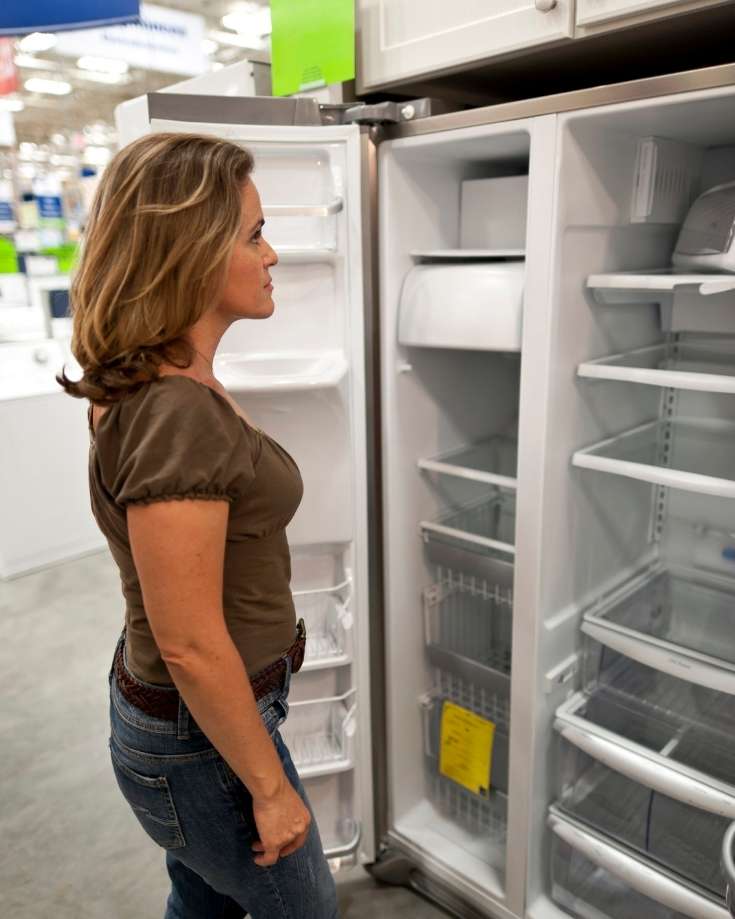
Depending on the size and type of your RV refrigerator, it can cost anywhere from $500 to $4,000 to replace.
Price is an important factor when choosing a fridge, but it’s not the be-all and end-all. Take all factors into consideration. Sometimes the more expensive models provide better value in the long term as they may be more efficient and durable.
Is it better to run an RV fridge on propane or electric?
There is no definitive answer to this question. It depends on several factors, such as where you plan to park, how often you use it, and any existing power sources. Here is a general guideline to help you choose the right option for your needs.
If you use your RV fridge primarily while camping off the grid and already have a propane tank in your RV, propane gas is likely your best option.
Propane is an efficient way to power an RV fridge, and it doesn’t need extra solar panels or batteries.
On the other hand, if you already have a 12v electrical system installed or don’t have propane tanks fitted, electric is probably best. You can run your fridge from your RV batteries and recharge them from generators, solar power, or shore power.
2-way and 3-way fridges offer a good compromise between propane and electric, so you don’t have to commit either way.
Should I leave my RV refrigerator on all the time?
If your fridge runs on propane, you should always switch it off while driving. Or switch it to another power source while you’re on the road.
When an RV refrigerator is running on electricity, in theory, you can leave it switched on all the time. That said, when preparing your RV for storage, there’s no point in leaving it switched on.
If you don’t have any food that needs refrigeration, you don’t need to keep the fridge on.
Will the RV fridge run off the battery while driving?
A refrigerator in an RV can run off battery power while driving. In fact, if you usually run your fridge off propane, it’s a safety must to flip it to the battery charging (or off).
Does an RV refrigerator run better on gas or electric?
While a fridge works faster on gas, it remains colder for a longer time on electricity. However, gas fridges do lose a bit of their effectiveness in higher temps.
Can you use a regular refrigerator in an RV?
Yes, but the important thing is what kind of access to power you will have. If you are going to be connected to a campground pedestal all the time, a residential fridge can work well for you. Other things that also matter are the size of the fridge, how much power it draws, and how sturdily built it is.
How long does a refrigerator last in an RV?
Typically RV fridges can last anywhere between 14 to 18 years. Residential refrigerators may not last as long, but they can also last for a decade or more with proper maintenance.
Do RV refrigerators need to be level?
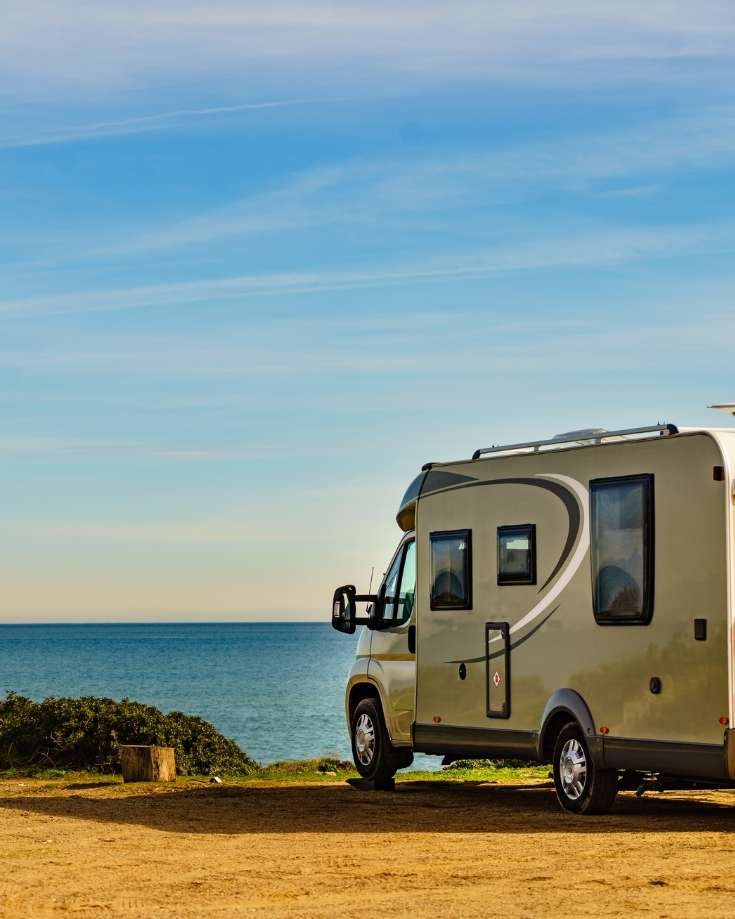
An RV refrigerator does not need to be level to operate. However, an absorption refrigerator must be level for the most efficient cooling.
Suppose the refrigerator is tilted even a little bit. In that case, the cooling process will not work as smoothly and may even be damaging over a prolonged period.
Though it may not seem like a big deal, ensuring your RV refrigerator is level is vital for its longevity and function.
Compressor fridges aren’t so sensitive, but it’s still a good idea to keep them level so that the cooling elements can do their job correctly.
Overall, it’s good practice to keep your RV refrigerator level, no matter what type.
A fit-for-purpose leveling system is essential in an RV anyway. All those boondocking sites with less than even terrain makes it a must-have. Plus, there are plenty of different stabilizing jacks to help make the job a breeze.
In Conclusion
There are a few different types of fridges for RVs, and the one you’ll want will depend on your RV lifestyle.
A propane fridge is a good option if you’re a full-timer or frequently go off-grid. However, if you have a smaller camper and a well-specified electrical system, a 12v fridge is a perfect solution. Likewise, large families who enjoy entertaining and rely on campground hookups will suit a residential fridge.
And suppose you’re on a budget or don’t use much food that needs refrigeration. In that case, you could get away without an RV refrigerator altogether.
The best RV refrigerator model for you depends on your RV size and lifestyle. Choose wisely.
Use the comments below to let us know about your experiences with RV fridges.
Angela Devaney

Angela Devaney, a former IT project management professional, embarked on an adventurous journey of full-time travel, which included touring West Africa in a converted overland truck and converting an ex-military 4×4 Sprinter van into a camper for a five-year South American expedition. She now utilizes her hands-on experience to create practical RV living and van life advice as a full-time digital media producer, reaching over a million users annually through her YouTube channel, blog, and newsletter. Angela also lends her expertise as the editor-in-chief of the Campervan Electrics Handbook.






